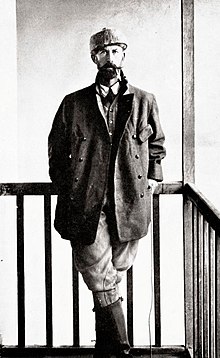Percy Fawcett
Along with his eldest son, Fawcett disappeared under unknown circumstances in 1925 during an expedition to find "Z"—his name for what he believed to be an ancient lost city in the uncharted jungles of Brazil. John Hemming, the Canadian explorer and historian of the Brazilian Indians, declared Fawcett a “Nietzschean explorer” spouting “eugenic gibberish,” although the writer David Grann also believes that Fawcett showed enlightened traits.
Does the Amazon jungle conceal a vanished empire?
By David Grann
At the time, the most forceful critic of this genocidal paradigm was Bartolomé de Las Casas, a Dominican friar who had traveled throughout the Americas. In a famous debate with Sepúlveda and in a series of treatises, Las Casas tried to prove, once and for all, that Indians were equal humans ("Are these not men? Do they not have rational souls?"), and to condemn those "pretending to be Christians" who "wiped them from the face of the earth." In the process, however, he contributed to a conception of the Indians that became an equal staple of European ethnology: the "noble" savage. According to Las Casas, the Indians were "the simplest people in the world," "without malice or guile," who are "totally uninterested in worldly power."
Although in Fawcett's era both conceptions remained popular in scholarly and popular literature, they were now filtered through a radical new scientific theory on the origins of humankind: evolution. Victorians now attempted to make sense of human diversity not in theological terms but in biological ones. A popular anthropology manual, which Fawcett studied, included chapters on "Anatomy and Physiology," "Hair," "Colour," Odour," "Physical Powers," "Senses," and "Heredity." The Victorians wanted to know, in effect, why some apes had evolved into English gentlemen and why some hadn't.
Fawcett was deeply influenced by such racist ideas; his writings are rife with images of Indians as "jolly children" and "ape-like" savages. And he constantly struggled to reconcile what he saw with everything he had been taught. The only thing he was certain of was that the Amazon and its people were not what everyone assumed them to be. Too much evidence indicated that the jungle had once been the center of a great civilization.
On the positive side, Fawcett respected the Indians he met, deeming them intelligent, industrious, and so forth. He especially admired their ability to survive in the jungle and heal maladies with herbal medicines. The further he got from civilization, the more he recognized their ability to farm and provide for themselves. He blamed their "savagery" toward white men on the latter's depredations. He was appalled by the atrocities the rubber gangs committed, and vowed never to kill or harm the Indians himself.
On the negative side, Fawcett believed the Indians he hadn't met were as cruel and vicious as people said. He thought the successful Indians must be the remnants of a vanished civilization, perhaps Phoenicians or the Lost Tribe of Israel. As evidence of this, he and others pointed to light-skinned or albino Indians and claimed they were descended from white men. Eventually he came to imagine his "Z" was some sort of mystical, otherworldly city a la Brigadoon, Shangri-La, or Atlantis.
These views may be better than those of predecessors such as Charles Darwin, Mark Twain, or Theodore Roosevelt. They may be similar to those of the anthropologists who studied Ishi around the same time. But they're definitely a mixed bag for Indians.
For more on the Sepúlveda-Las Casas debate, see Those Evil Europeans.


3 comments:
Las Casas also developed the notion that Indians were lost Jews.
Perhaps the creators of Mormonism owe his estate some royalties.
Hi there just had a quick glance over the article and found it interesting but i was hoping to get some advice as i need to get and general over view of the "Victorian Race Theory" and was hoping if some one could pointing me in the right direction of where to look for the information i am after.
Thanks.
Post a Comment